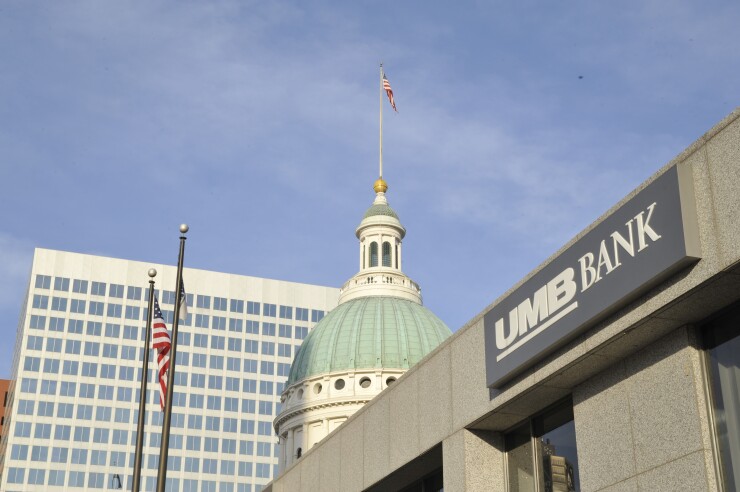
Executives at UMB Financial, one of several regional banks that's been scrutinized in recent weeks by analysts and ratings agencies, said that concerns about the prevalence of problems that led to the collapse of two banks last month are inflated.
During a quarterly earnings call on Wednesday, executives at the Kansas City, Missouri, company touted an uptick in the bank's average deposits since year-end, as well as a decrease in the percentage of uninsured deposits and a diverse deposit base.
Unrealized losses tied to UMB's fixed-rate securities portfolio have narrowed, and UMB has no need to sell bonds to fund loan growth, they added. The liquidity coverage on UMB's uninsured deposits increased to 116% as of last week, according to the bank.
"We have way, way overblown the impact of two failed banks, and expecting that that had something to do with the rest of us," CEO Mariner Kemper told analysts.
Regional banks, including those with high concentrations of uninsured deposits and significant levels of unrealized losses on their balance sheets, have been
Both collapsed banks were substantially reliant on uninsured deposits, and customers quickly pulled much of those funds when signs of trouble emerged. As of late December, uninsured deposits accounted for 88% of total deposits at Silicon Valley and 90% of total deposits at Signature, according to the Federal Deposit Insurance Corp.
The run on deposits at Silicon Valley Bank was sparked by concerns about unrealized losses in the bank's securities portfolio. The Santa Clara, California, bank had loaded up on low-yielding, long-term securities when it was flush with deposits in the earlier stages of the pandemic. Those investments lost substantial value when interest rates started rising last year.
At UMB, total estimated uninsured deposits were $21.3 billion, or approximately 66.6% of total deposits, as of March 31, the company said. That was down from 75% on Dec. 31.
Meanwhile, unrealized losses on UMB's available-for-sale securities portfolio shrank to $677.7 million, down from $771.6 million at the end of December, the company said Wednesday. Unrealized losses on securities held to maturity narrowed to $489.9 million from $580.9 million at year-end. Across the industry, unrealized losses fell between January and March as interest rates declined.
Though last month's turmoil has largely subsided, credit ratings agencies are keeping close tabs on the U.S. banking sector. Late last week, Moody's Investors Service downgraded UMB and 10 other U.S. regional banks, saying the revisions reflected "negative credit implications" across the industry that could hurt banks' ability to generate profits.
Ten of the Moody's downgrades, including UMB's, were by one notch, with the 11th down by two notches. The new rating for UMB is Baa1, down from A3.
In a press release announcing the UMB downgrade, Moody's said that it reflected "rising risk in the bank's funding profile as well as the deterioration in the bank's capital and liquid resources." The ratings firm cited year-end numbers for uninsured deposits, unrealized losses in the fixed-rate securities portfolio and metrics that indicated loan growth was outpacing deposit growth.
Earlier this week, Fitch Ratings revised its ratings outlook for UMB from "stable" to "negative."
On Wednesday's call, Kemper downplayed the importance of last month's bank failures for UMB.
"There was a little disruption at the very beginning," he said, explaining that the immediate fallout of Silicon Valley Bank's failure hurt UMB with a small number of clients. "But since then, that's all recovered."
And in response to a question about whether the ratings actions would change how UMB does business, Kemper said: "I would just suggest that we move on and stop talking about the rating agencies, which add no value."
During the first quarter, UMB reported net income of $92.4 million, down 12.8% from the year-ago period. Its net interest income rose 14.9% year over year as a result of an increase in average loans, a shift in earning assets and higher interest rates. Fee income rose 5.3%, due to higher brokerage, life insurance, corporate trust and bankcard income, the company said.
Average deposits were $31.6 billion for the quarter, down 3.1% year over year. Average loans totaled $21.3 billion, an increase of 22.5% from the same quarter last year.
"Comments made publicly about the health of the banking industry, driven by the mistaken presumption that the drivers of the failure of two banks would apply to other banks generally, did a great disservice not only to UMB, but to regional banks as a whole," Kemper said in a press release announcing the results.
"Despite conjectures in the aftermath of Silicon Valley Bank's failure, not every bank, including UMB, needs to sell investment securities at a loss."






